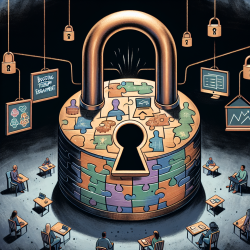Introduction
In the realm of special education, engagement and compliance are critical. As a Special Education Director, you're tasked with ensuring that every student receives the best possible support. However, therapist shortages can pose a significant challenge. Drawing insights from the research article "Promotion of couples’ voluntary HIV counselling and testing in Lusaka, Zambia by influence network leaders and agents," we can glean valuable strategies to enhance engagement and overcome staffing hurdles.
Lessons from Lusaka: The Power of Influence Networks
The study in Lusaka, Zambia, demonstrated the effectiveness of using influential network leaders (INLs) and agents (INAs) to promote voluntary HIV counselling and testing (CVCT). This approach led to increased engagement and uptake of services. The core takeaway is the power of leveraging existing networks and influential figures to drive participation and compliance.
Applying the Research: Strategies for Special Education
Here are some actionable strategies inspired by the Lusaka study that you can implement to improve engagement in special education:
- Leverage Existing Networks: Identify influential figures within your school community, such as respected teachers, parents, or community leaders, to promote engagement in therapy sessions.
- Community-Based Promotion: Like the INAs in Lusaka, utilize community-based approaches to spread awareness and encourage participation in therapy programs. This can include workshops, informational sessions, and community events.
- Focus on Relationship Building: The study found that invitations from socially acquainted individuals were more successful. Encourage therapists to build strong relationships with students and their families to foster trust and engagement.
- Tailor Invitations to the Audience: Customize communication and invitations to therapy sessions based on the unique needs and preferences of each student and family.
- Utilize Mobile and Flexible Solutions: Consider offering mobile therapy sessions or flexible scheduling to accommodate families' needs, similar to the mobile units used in the study.
Encouraging Further Research
While the Lusaka study provides valuable insights, it's essential to continue researching and adapting these strategies to fit the specific context of special education. Consider conducting surveys or focus groups within your district to identify the most effective methods for engaging students and families.
Conclusion
The Lusaka study highlights the importance of strategic engagement through influence networks and tailored approaches. By applying these lessons to special education, you can enhance therapy participation and address therapist shortages effectively. For a deeper understanding of the study and its outcomes, we encourage you to explore the original research paper: Promotion of couples’ voluntary HIV counselling and testing in Lusaka, Zambia by influence network leaders and agents.










